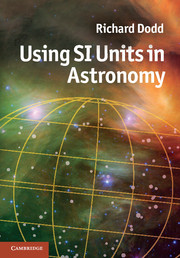Book contents
- Frontmatter
- Contents
- Preface
- Acknowledgements
- 1 Introduction
- 2 An introduction to SI units
- 3 Dimensional analysis
- 4 Unit of angular measure (radian)
- 5 Unit of time (second)
- 6 Unit of length (metre)
- 7 Unit of mass (kilogram)
- 8 Unit of luminous intensity (candela)
- 9 Unit of thermodynamic temperature (kelvin)
- 10 Unit of electric current (ampere)
- 11 Unit of amount of substance (mole)
- 12 Astronomical taxonomy
- References
- Index
2 - An introduction to SI units
Published online by Cambridge University Press: 05 December 2011
- Frontmatter
- Contents
- Preface
- Acknowledgements
- 1 Introduction
- 2 An introduction to SI units
- 3 Dimensional analysis
- 4 Unit of angular measure (radian)
- 5 Unit of time (second)
- 6 Unit of length (metre)
- 7 Unit of mass (kilogram)
- 8 Unit of luminous intensity (candela)
- 9 Unit of thermodynamic temperature (kelvin)
- 10 Unit of electric current (ampere)
- 11 Unit of amount of substance (mole)
- 12 Astronomical taxonomy
- References
- Index
Summary
The name Système International d'Unités (International System of Units), with the abbreviation SI, was adopted by the 11th Conférence Générale des Poids et Mesures (CGPM) in 1960.
This system includes two classes of units:
- base units
- derived units,
which together form the coherent system of SI units.
The set of SI base units
There are seven well defined base units in the SI. They are: the second, the metre, the kilogram, the candela, the kelvin, the ampere and the mole, all selected by the CGPM and regarded, by convention, to be dimensionally independent. Table 2.1 lists the base quantities and the names and symbols of the base units. The order of the base units given in the table follows that of the chapters in this book.
The set of SI derived units
Derived SI units are those that may be expressed directly by multiplying or dividing base units, e.g., density (kg .m-3) or acceleration (m .s-2) or electric charge (A. s). Table 2.2 lists examples of SI derived units obtained from base units.
Special names have been assigned to selected derived units that are used to prevent unwieldy combinations of base SI names occurring. Table 2.3 gives some examples of such special names, with the derived unit expressed in terms of both other SI units and of base SI units only. Note that the radian and steradian were originally termed supplementary SI derived units.
Information
- Type
- Chapter
- Information
- Using SI Units in Astronomy , pp. 12 - 23Publisher: Cambridge University PressPrint publication year: 2011
